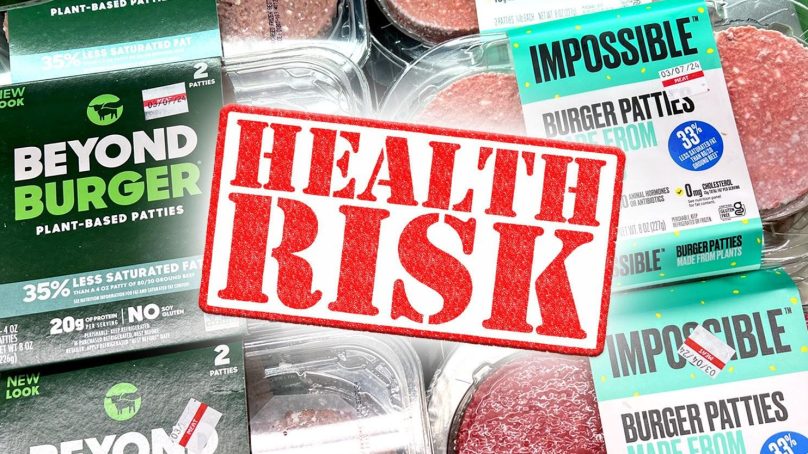
Fake meats lack essential nutrients found in natural meats, including specific amino acids that are crucial for muscle maintenance and overall health. Despite claims of sustainability, studies show that meat alternatives have far greater greenhouse gas emissions than traditional livestock practices.
Evidence supports regenerative farming methods as far more beneficial for the environment compared to the industrial farming methods upon which ultra-processed meat alternatives rely.
The documentary critiques current global policies that push for meat alternatives, suggesting a broader agenda is at play – one that may compromise food security and individual health through increased reliance on ultra-processed food.
A 2024 systematic review of the literature confirmed what multiple studies have shown – the higher your intake of ultra-processed food, the higher your risk of adverse health outcomes.
The analysis, which included 45 unique pooled analyses and 9,888,373 participants, found direct associations between 32 health parameters and exposure to ultra-processed food, including metabolic dysfunction, cancer, mental, respiratory, cardiovascular and gastrointestinal issues, as well as all-cause mortality.
Depression and anxiety disorders were also highly correlated with ultra-processed food consumption. Previous studies have also linked ultra-processed foods to cognitive decline and obesity.
Considering the well-established effects of ultra-processed foods, it’s only a matter of time before the truth comes out about the health effects of lab-grown and cultured meats, which are the epitome of ultra-processed food.
As noted in the film, the fake meat industry is an outgrowth of the vegan trend, which eschews any food derived from animals. However, perhaps there’s more to it than that.
As noted by Gravitas: “What do Harvard University, internet vegans and the World Economic Forum [WEF] all have in common? A religious desire for the world to go vegan. But why? Is it an effort to stop global warming? Is it an earnest attempt at making everyone healthier? Is it a desperate plea to end animal cruelty?
“The answers may surprise you. Beyond Impossible reveals an uncomfortable truth about a world where people’s good intentions are being taken advantage of by everyone from vegan doctors to global elites hellbent on instituting planetary policies that remove all personal choices from the kitchen and beyond.
“Joined by experts that include doctors, journalists and even former vegans, [health expert, director and co-producer] Vinnie Tortorich maintains that while we still have the power of free will, it’s only a matter of time before it’s too late.”
As explained in the film, it’s exceedingly difficult to get all the nutrients you need from a vegan diet, and while you could theoretically supplement yourself out of short-term trouble, you’d need to take a high-quality vitamin B12, iron, calcium, vitamin D, omega-3 and extra protein supplements, at a bare minimum, to avoid some of the most common nutritional deficiencies associated with a meat-free diet.
However, as stressed by science journalist Nina Teicholz in the film, “Many people cannot absorb B vitamins and minerals in their supplemental forms.”
Additionally, plant proteins aren’t equivalent to meat-based proteins. They’re not even equivalent to whole plant foods.
As noted by Tortorich: “Here’s the crazy part of all these fake meats. They’re not really made from vegetables. They’re made from monocultured crops. They’re made from starches, fake proteins and seed oils.”
“Plant-based” meat alternatives don’t contain the same amino acids, and they’re not as digestible as meat protein, so meeting your protein requirements for muscle maintenance and everything else could be a challenge.
Instead, fake meats contain novel proteins that no one fully understands yet. For example, the ingredient in Impossible Burger’s meat that makes it taste like meat is genetically engineered soy leghemoglobin, for which there are no long-term health studies. The process to make it also creates at least 45 other proteins as byproducts, which are also consumed and have never been evaluated.
Fake meats also typically contain the absolute worst type of fats possible, namely polyunsaturated fats (PUFAs) that are high in linoleic acid and/or monounsaturated fats (MUFAs) high in oleic acid.
For example, a half-pound serving of organic grass-fed beef will provide less than half a gram of linoleic acid (500 milligrams). Compare this to a serving of an Impossible Burger or Beyond Meat burger, which have 10 to 20 times the amount of linoleic acid.
So fake meat can only add to the catastrophic metabolic deterioration of your health caused by other processed and ultra-processed foods.
Some fake meats will incorporate “healthier” oils like olive oil, but that still doesn’t solve the problem, as MUFAs are nearly as bad as seed oils. When consumed in excess, MUFAs like oleic acid will increase insulin resistance, promote fat storage and decrease your metabolic rate.
I recently interviewed Brad Marshall on reductive stress and he has done a magnificent job in highlighting the problems with oleic acid and how it increases the risk of obesity and metabolic dysfunction. That interview will be out shortly.
Further exploration into the relationship between olive oil and obesity reveals complex dynamics. Despite high local olive oil consumption, studies suggest that its impact on body mass index (BMI) is negligible.
This challenges the notion that olive oil directly contributes to obesity. However, this narrative took a defensive turn when researchers, rather controversially, attributed obesity rates in Mediterranean regions to lifestyle factors like physical inactivity rather than dietary habits.
This perspective was tested in experiments where dietary olive oil was shown to induce insulin resistance in mice, suggesting a potential metabolic concern.
In-depth studies have used animal models to isolate the effects of oleic acid, aiming to control variables present in olive oil like polyphenols and saturated fats.
Results indicated that pure oleic acid led to even greater insulin resistance in mice, highlighting concerns over its metabolic impacts when isolated from other components typically found in olive oil. This points to the complexity of olive oil’s health impacts, suggesting that beneficial outcomes might be more attributable to its polyphenol content rather than the oil itself.
The discourse expanded with studies focusing on how MUFAs influence fat metabolism and storage, particularly through mechanisms involving the desaturase enzymes, which convert saturated fats into MUFAs.
These enzymes, upregulated by dietary MUFAs, play a significant role in lipogenesis, the process of converting carbohydrates into fatty acids.
This biological pathway is crucial as it highlights how dietary fats influence lipid profiles and underscores the nuanced interplay between different types of dietary fats and metabolic health.
On a side note, in the film, Tortorich presents the ideal diet as being one that is nearly devoid of carbs, sugars and grains. While I would have agreed with him on that as recently as a year or two ago, I’ve since come to understand that this is a serious mistake, as you absolutely need carbs for optimal metabolism, mitochondrial function and energy production.
He doesn’t dwell on that in the film so I won’t go into further detail on this here either. To learn more, see “A Surprising Reason Why You May Need More Carbs in Your Diet.”
To his credit, Tortorich correctly stresses the benefits of saturated animal fats, eggs and whole-fat dairy, and the importance of avoiding seed oils and processed foods.
While not discussed in this documentary, one-third of your protein also needs to be collagen, and there’s no plant-based alternative for that.
Collagen is the most common and abundant of your body’s proteins, accounting for about 30 per cent of the total protein in your body. One of its primary purposes is to provide structural scaffolding to allow tissues to stretch and flex while maintaining tissue integrity.
Collagen is found in your skin, connective tissues like tendons, ligaments, cartilage and fascia, your bones, organs, blood vessels, musculoskeletal system, hair and nails.
Collagen is also crucial for bone health and recovery from soft tissue injuries and can help improve sleep, reduce joint pain, improve gut health, glucose tolerance and blood pressure, reduce cardiovascular damage, lower your risk of osteoporosis and lower inflammation and oxidative damage.
The primary amino acids in collagen – glycine, proline and hydroxyproline – make up the matrix of connective tissue. Beef contains very little of these amino acids, so eating only muscle meat will not provide enough amino acids to allow you to build strong connective tissue and maintain bone strength.
A vegan diet will put you at even greater risk, as the amount of these amino acids is even lower in plant foods than in red meat.
Another animal-based food that cannot be replicated by vegan alternatives is full-fat, raw dairy.
According to recent research, the odd-chain saturated fats pentadecanoic acid (C15:0) and heptadecanoic acid (C17:0) found in whole-fat dairy are likely some of the most important fats in the human diet and C15:0 may be essential, although it’s not currently recognised as such.
As noted in the 2020 scientific report, Efficacy of Dietary Odd-Chain Saturated Fatty Acid Pentadecanoic Acid Parallels Broad Associated Health Benefits in Humans: Could It Be Essential?: “Dietary odd-chain saturated fatty acids (OCFAs) are present in trace levels in dairy fat and some fish and plants. Higher circulating concentrations of OCFAs, pentadecanoic acid (C15:0) and heptadecanoic acid (C17:0), are associated with lower risks of cardiometabolic diseases, and higher dietary intake of OCFAs is associated with lower mortality.
“Population-wide circulating OCFA levels, however, have been declining over recent years.
“Here, we show C15:0 as an active dietary fatty acid that attenuates inflammation, anaemia, dyslipidaemia, and fibrosis in vivo, potentially by binding to key metabolic regulators and repairing mitochondrial function.
“This is the first demonstration of C15:0’s direct role in attenuating multiple comorbidities using relevant physiological mechanisms at established circulating concentrations.
“Pairing our findings with evidence that (1) C15:0 is not readily made endogenously, (2) lower C15:0 dietary intake and blood concentrations are associated with higher mortality and a poorer physiological state, and (3) C15:0 has demonstrated activities and efficacy that parallel associated health benefits in humans, we propose C15:0 as a potential essential fatty acid.”
But getting back to the issue of fake meat, it’s important to realize that it’s the very definition of ultra-processed food.
As noted by Michael Hansen, a senior staff scientist at Consumer Reports, meat alternatives are all just junk food and genetically modified organisms (GMOs) on steroids.
- The Defender / Dr Joseph Mercola is the founder of Mercola.com.











